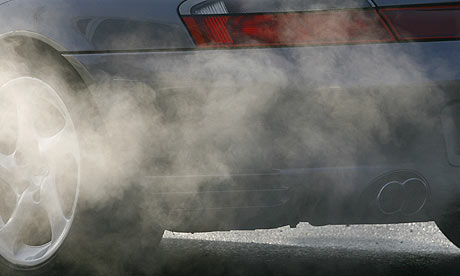
Carmakers will have to slash the carbon emissions of new cars sold in Europe by a third by 2020, according to leaked European Commission documents seen by the Guardian.
The EC proposals would be legally binding and the document plans for even stricter emissions targets for 2025 and 2030, which could only be met if hybrid or electric vehicles become mainstream.
Greg Archer, of campaign group Transport & Environment, said: "Tighter CO2 standards for cars will be welcomed by drivers across Europe who will save €500 per year at the petrol pump on average if this proposal is adopted."
But car manufacturers warned that tough regulation could harm an industry already struggling with the economic crisis and foreign competition.
New car registrations in Europe are forecast to fall by 7% in 2012, and Volkswagen was the only major manufacturer in Europe that did not lose money in 2011.
"Regulation, rigid by nature, too often adds undue complexity and costs, or limits flexibility," said ACEA, the European Automobile Manufacturers' Association, in a statement calling for "smarter" regulation.
The EC document is expected to be published in July and later approved by the European parliament and the Council of Europe over the next year. Transport exhaust fumes contribute roughly a third of the continent's greenhouse gas emissions and rose by 26% between 1990 and 2008. Measures to cut carbon dioxide from transport are essential if Europe is to meet its targets for tackling climate change.
The EC wants to limit the average emissions of vehicles sold in 2020 by a manufacturer to 95 grams of CO2 per kilometre travelled. It is currently about 140g CO2/km and there is already a binding limit of 130g CO2/km set for 2015.
Manufacturers failing to comply would face fines of €95 (£76) for every gram over target per vehicle. The commission's impact assessment states the 95g CO2/km limit would save European drivers approximately €25bn a year in fuel costs.
The commission document states it would be "desirable" by the end of 2014 to set even tougher targets for 2025 and 2030, in order to "provide longer term certainty for the automotive industry to invest and innovate."
But Archer said good intentions were not enough and that the commission had to commit to specific targets after 2020. "There is a real danger that Europe is going to lose its competitive edge in low-carbon vehicles if suppliers don't get the investment certainty needed to develop advanced technologies," he said, noting that the EC had considered a target of 70g CO2/km for 2025 in 2010.
Archer pointed out that past claims that efficiency regulations would make cars unaffordable had been proven wrong, adding: "Car prices came down in real terms and consumers have benefited considerably from improved fuel efficiency. There is no doubt that legislation provides a massive boost to innovation, and costs fall over time."
Jean-Marc Gales, chief executive of the European auto suppliers' association CLEPA, supported the low-carbon regulations: "Europe's industry is considered a world leader. We need regulation to keep that advantage."
Trade union leaders also backed the EC proposals. "Our past experience has shown that only strict legal frameworks will push the industry into the right direction," said Wolf Jäcklein, from IndustriAll European Trade Union. "For us trade unions, that's the only way we can ensure a future for Europe's automotive industry and continued quality jobs for millions of workers here."

